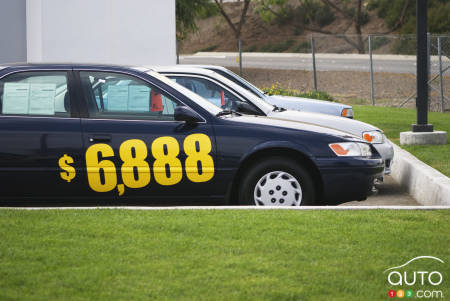Making this choice is not as simple as it might seem. There are advantages and disadvantages to dealing with both types of sellers.
Private individual
When buying from a private seller, you can expect to pay a lower price. As the person has no overhead or costs involved in selling the car, he or she has no need to make an actual profit. As well, depending on regional laws, you may save on sales taxes given that you are not dealing with a licensed professional.
The down side include not being able to purchase an extended warranty should that interest you and, more importantly, it limits any if not all recourse against the seller in the event that something goes awry in the transaction or with the car itself.
Dealer
By purchasing a car from a dealer, you may have the option to purchase an extended warranty. Be warned that this may not always the best idea as some warranty-issuing companies are difficult to deal with. On this issue, we would suggest that you contact the APA for further information.
Licensed dealers must be bonded. In the event that something does go amiss in the transaction or with the car itself, this bond gives the buyer some guarantees in the event that the dealer closes down or chooses not to pay up following a lawsuit.
Negative points to consider here are the fact that you will most likely pay more for the car itself and will have to pay total sales taxes, administrations fees and other related costs.
Tips:
- Beware of fraudulent ads that require a deposit before you can see the vehicle that is for sale.
- Never ever hand out any sum of money without first finding out more about the seller and the car or coming into direct contact with both.
- Make sure that all fees are discussed prior to signing any contract.
DEALER? PRIVATE? WHAT'S WHAT?
Many consumers wrongly believe the purchasing process to be simpler when dealing with a professional dealer. The fact is that ALL steps enumerated and elaborated upon in this guide apply to both transactions, save perhaps for the contract.
Dealer
An average sized dealer sources a large number of its cars from a car auction. Beyond possibly looking up the Carproof report, they do little or no research on the car's pedigree. Essentially, they quite nearly purchase cars blindly and pass them on the buyer in the same manner.
The dealership is a business and therefore must make a profit on every transaction. This typically entails higher purchase prices for no other reason than covering expenses and making money.
Certainly, the fact that the dealer will prepare all the paperwork and possibly even plate to car for the buyer, can add a level of convenience. This though should not be the main reasons for taking this route.
In the event that the transaction with the dealer goes sour or the car is a complete disaster, the bond which it must hold becomes a way to recover losses should a court judgment be rendered in the consumer's favor and the dealer has gone bankrupt.
The most attractive element in a transaction with a dealer is the opportunity to purchase a certified car and/or an extended warranty. Depending on the company backing the warranty, it may be money well invested or a complete waste. The APA has dealt with a number of them over the years and could guide you in your decision making.
Private Seller
A real private seller should normally be capable of producing maintenance records dating back to the time at which the car was purchased. This portfolio will cast a fairly clear picture on how the car's been cared for and possibly indicate what will have to be done next.
As the individual is only looking to offload their vehicle, purchase prices will typically be lower not to mention more negotiable. A contract should still be drawn to clear up both parties' intentions and legal obligations in the transaction.
In either case, it would be wise to find out if the vehicle has a lien registered against it.
Scenario
The 2007 Audi Q7 that interests the Johnsons is offered for sale by a local Audi dealer as part of their used car inventory. The limited number of Q7s for sale by private individuals, or so advertised, dissuade the family from searching any further along this path.
This and the fact that the dealer holds a number of Q7s in stock made the decision easier. The principal point that caught the Johnsons' attention was the "Certified Pre-Owned" note that appears in the advertising. The clan makes an appointment and heads out the dealership.
Once there, they are introduced to a salesperson and make their way to the Q7 in question. As Mr. Johnson is an avid golfer, he thought to bring his set of golf clubs to see if they fit length- and width-wise. Once the tour of the vehicle completed, a brief discussion ensues pertaining to pricing, fees and any other expenses.


